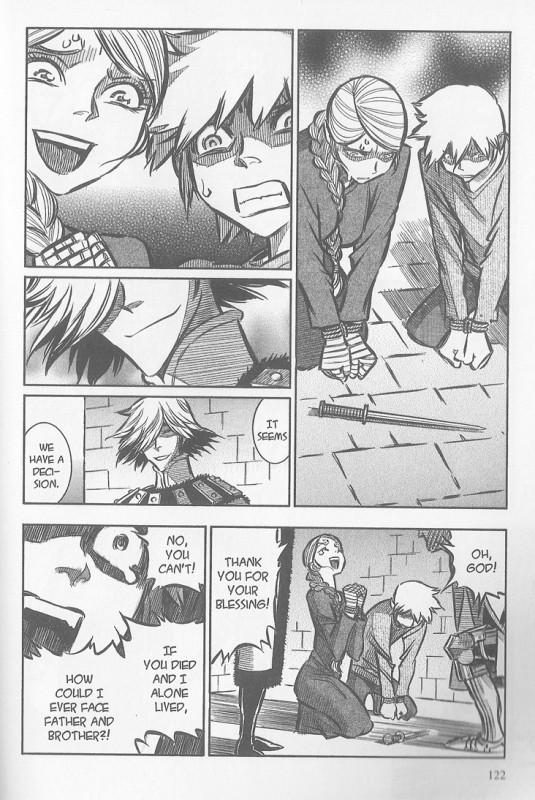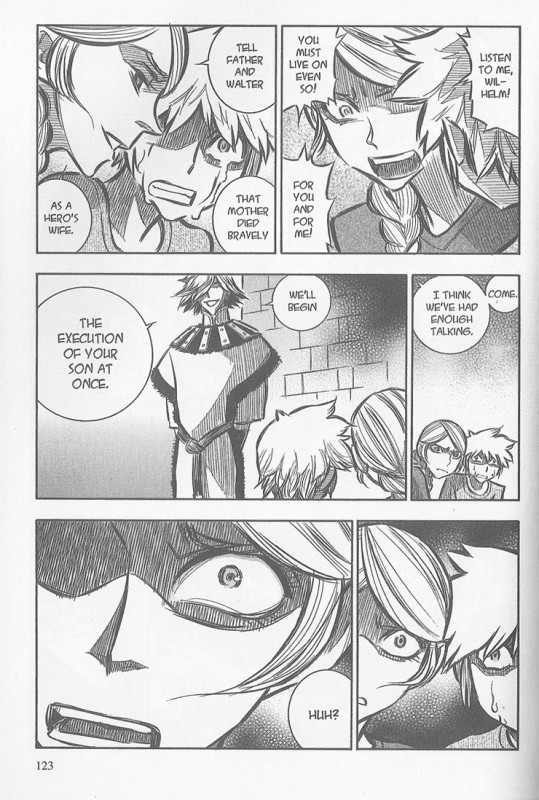
Mitsuhisa Kuji’s Wolfsmund: death
May 21st, 2014 Posted by david brothersWolfsmund is created by Mitsuhisa Kuji, translated by Ko Ransom, and published by Vertical. I’m talking about volume 3, but you should start with the first volume
, assuming your stomach and soul can handle it. I waffle and wobble a bit, personally.
I’m not too squeamish when it comes to entertainment, but it’s really down to presentation. Flash beheadings, brutal beatings, none of that really moves the needle in terms of actual existential terror. It’s when things get too specific and personal that I start checking out. Eyeball trauma gets me good, even in garbage movies like 28 Weeks Later. Hannibal was gross from jump, but it didn’t gross me out until season two showed someone tearing themselves free from a sculpture they’d been stitched into.
Mitsuhisa Kuji’s Wolfsmund excels at the specific and personal, and I’m torn between being into it and hitting the emergency eject button. It’s set in the past, at a gateway between two lands governed by a man who specializes in educational cruelty. It is grim and difficult to read. I’m three volumes in and there’s no real hope in sight. Compelling characters are put to the sword or worse on a regular basis. The first volume lays out what to expect: there are people who die, there are people who escape, and there is the man who sits in judgment of all of them and doesn’t let anyone pass without taking skin off their back.
Volume two was exceedingly cruel, cruel enough to where I put the series to the side for a few months. Volume three, purchased on a whim relatively recently, still made me cringe. In movies, if someone’s getting their eyes stabbed out, I can look away. In comics, you gotta look before you turn the page. You have to register what you’re seeing before you realize it’s horrible.
I tried to read the torture scene in volume three a couple times, not willing to admit defeat, before I eventually just bit down and flipped past it. Kuji got me. She got me good. The fingernails, or the imaginings that come along with reading a scene of fingernail torture, put me down for the count and I lost a few panels. She followed it with a scene where a man offers a mother and son a chance. He will spare one of them. Whoever the sword points to when it falls will die. The sword is placed point-down, tips, falls, and:

A sword is for stabbing, you see. It’s cruel poetry. The pommel doesn’t matter. Starving dogs are set on the son. The mother rushes to his rescue. She fails.
Kuji played assistant for Kentaro Miura, creator of hyper-violent medieval tale Berserk, and Kaoru Mori, creator of the maid soap opera Emma. Wolfsmund doesn’t feel like a marriage of those influences, but you can feel both influences creeping into the work. The art in Wolfsmund is very well-rendered and detailed. I can’t speak to its period-appropriateness, but the costumes feel real. They’re full of details and accoutrements that feel like they make sense.
Wolfsmund is an easy book to fall into, to believe in, and that makes the trauma all the worse. It’s a creeping, personal kind of cruelty. The characters in the book and Kuji herself dedicate scads of time to showing us someone else’s pain in excruciating detail. It’s not like Gantz, which could never figure out if it wanted to terrify or titillate. It’s un-erotic in the extreme, so uncomfortable and dark that you wince at the art. (The actual instances of sex and nudity in Wolfsmund are often difficult. There’s no guarantee that either party will survive the scene, much less the book, and they’re often book-ended with skin-crawling horrors.)
Wolfsmund is feel-bad comics, the sort of book you read and swear off and come back to again after a few months have passed. It’s full of non-stop cruelty and horrors, definitely beyond what I personally prefer. But there’s something about it and the feelings it inspires that is compelling, too. It’s a difficult kind of pleasure, and probably not even pleasure at all.
I read the second volume of Tsutomu Nihei’s Knights of Sidonia and the third volume of Wolfsmund back-to-back one night, well after the sun went down. The treatment of death in both books captured my imagination. Where Knights of Sidonia had an incredible depiction of impersonal cruelty, Kuji indulges in indulgent and beautiful cruelty in almost every chapter. You either get the knife or the glint of it. It’s mean and it’s ugly, heartbreakingly ugly at times, but I keep coming back to it.

